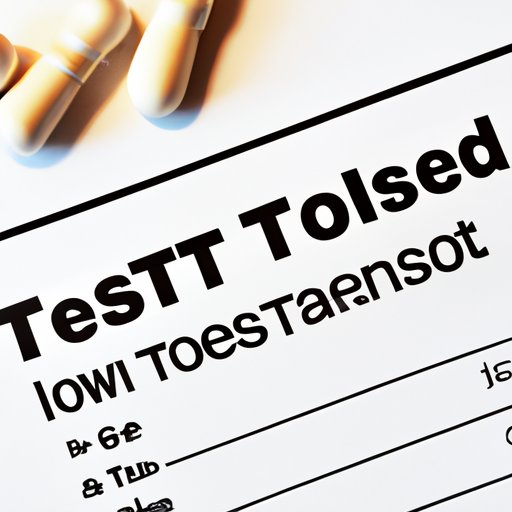
I. Introduction
Testosterone, the male hormone responsible for developing and maintaining male characteristics, is essential for overall health and wellbeing. However, as men age, their testosterone levels may decrease, leading to a range of symptoms that can affect their quality of life. In this article, we’ll outline how to tell if you have low testosterone, the diagnostic tests available, age-related decline and lifestyle risk factors that can contribute to low testosterone, and the available treatment options.
II. Symptoms to Look Out For
Some of the commonly experienced symptoms of low testosterone include loss of energy, decreased libido, decreased muscle mass, and depression. These symptoms can significantly impact a person’s quality of life, leading to decreased motivation, concentration, cognitive function, and even sexual dysfunction.
For instance, Michael, a 52-year-old father of two, noticed he felt more tired and had less energy than usual. He also experienced a decrease in his sex drive, an increase in body fat, and a decrease in muscle mass. After visiting his doctor for a blood test, Michael learned he had low testosterone levels and started receiving treatment to mitigate the effects.
III. Diagnostic Tests
If you experience any of these symptoms, your healthcare professional can perform a blood test to measure your testosterone levels. However, additional testing may be required to determine the cause of low testosterone. Your healthcare professional may perform further tests to measure other hormones that regulate testosterone, such as follicle-stimulating hormone (FSH) and luteinizing hormone (LH). Blood tests to check for thyroid, liver, and kidney function can also determine if these organs are contributing to low testosterone levels.
Getting diagnosed early and accurately is essential for developing an effective treatment plan. If you suspect you may have low testosterone, scheduling an appointment with your healthcare professional is the best course of action.
IV. Age-Related Decline
As men age, their testosterone levels naturally decline. However, some men may experience a more significant decline than others. Men usually experience this decline in their 40s and 50s. As a result, men may notice a decline in muscle mass and strength and decreased libido.
Fortunately, age-related decline is not a cause for concern for most men. However, it is vital to maintain a healthy lifestyle, including regular exercise and a balanced diet, to prevent the decline from exacerbating.
V. Lifestyle Risk Factors
Certain lifestyle factors can contribute to lower testosterone levels, such as obesity, excess alcohol or drug consumption, and a lack of exercise. For example, David, a 38-year-old sales executive, experienced a significant decline in his testosterone levels due to his unhealthy diet and lifestyle habits. After seeking medical treatment and implementing lifestyle changes, David has seen improvements in his testosterone levels and overall wellbeing.
If you have any of these risk factors, it is important to take the necessary steps to mitigate their effects. Eating a balanced diet that includes healthy fats, protein, and fiber, and regular exercise can improve testosterone levels and overall health. Additionally, reducing alcohol consumption, quitting smoking, and managing stress can also have a positive impact on testosterone levels.
VI. Treatment Options
Depending on the severity of low testosterone levels, there are several treatment options available, including testosterone replacement therapy or lifestyle changes. Testosterone therapy is an option for those with a severe deficiency, and it is administered through injections, gels, patches, or pellets. However, testosterone replacement therapy is not suitable for all men, and there are potential risks involved.
Lifestyle changes can also significantly impact testosterone levels. Regular exercise and a balanced diet can improve testosterone levels, while reducing alcohol consumption and managing stress can reduce their negative effects on testosterone.
It is important to consult with your healthcare professional to determine the most appropriate treatment option for you.
VII. Conclusion
Low testosterone can significantly impact a man’s quality of life, leading to decreased energy, libido, and mood. By understanding the symptoms, diagnostic tests, age-related decline and lifestyle risk factors, and available treatment options, men can take the necessary steps to maintain healthy testosterone levels and improve their overall wellbeing. If you experience any of these symptoms, schedule an appointment with your healthcare professional to receive an accurate diagnosis and develop a treatment plan that works best for you.





